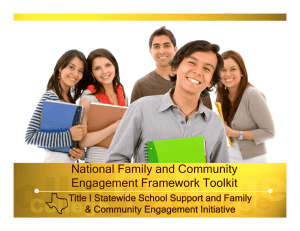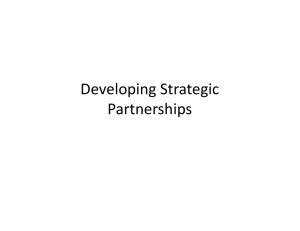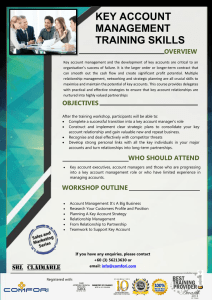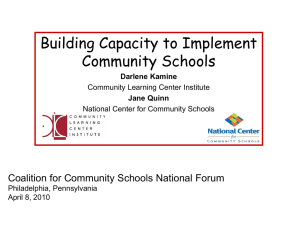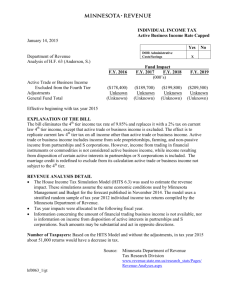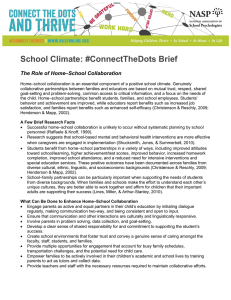Have We Forgotten Something? 8/10/2015
advertisement
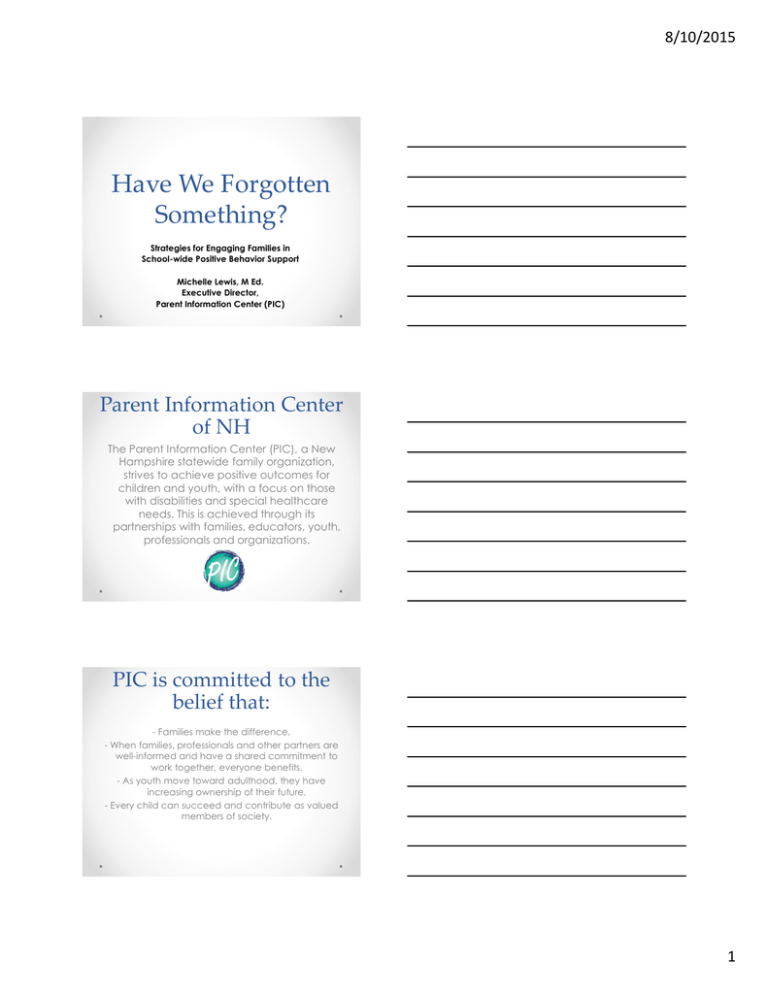
8/10/2015 Have We Forgotten Something? Strategies for Engaging Families in School-wide Positive Behavior Support Michelle Lewis, M Ed. Executive Director, Parent Information Center (PIC) Parent Information Center of NH The Parent Information Center (PIC), a New Hampshire statewide family organization, strives to achieve positive outcomes for children and youth, with a focus on those with disabilities and special healthcare needs. This is achieved through its partnerships with families, educators, youth, professionals and organizations. PIC is committed to the belief that: - Families make the difference. - When families, professionals and other partners are well-informed and have a shared commitment to work together, everyone benefits. - As youth move toward adulthood, they have increasing ownership of their future. - Every child can succeed and contribute as valued members of society. 1 8/10/2015 Why Is Partnership So Hard? We Say We Want It … • Research says its beneficial • There are federal laws that require partnerships • Can we agree? … Partnership has many different meaning, different views and different ideas The Definition of Family Engagement Family Engagement is any way that a child’s adult caretaker (biological parents, foster parents, siblings, grand parents, etc.)effectively supports learning and healthy development Karen Mapp, SEDL Differing Family Roles • Supporters of their children’s learning and development • Encouragers of an achievement identity, a positive self image, and a “can do” spirit in their children • Monitors of their children’s time, behavior, boundaries and resources • Models of lifelong learning and enthusiasm for education • Advocates/Activists for improved learning opportunities for their children and at their schools • Decision-makers/choosers of educational options for their children, the school, and community • Collaborators with school staff and members of the community on issues of school improvement and reform Mapp, Karen L., and Kuttner, Paul J. (2013). Partners in Education: A Dual Capacity-Building Framework for Family–School Partnerships. SEDL 2 8/10/2015 What do we mean by Dual‐Capacity? Capabilities Connections Confidence Cognition Capabilities Skills & Knowledge Families • Need to know about student learning • Need to understand the inner workings of school as a system • Need advocacy and educational support Capabilities Connections School & District • Need knowledge about the community • Need knowledge about cultural competency • Need to building trusting relationships Confidence Cognition Mapp, Karen L., and Kuttner, Paul J. (2013). Partners in Education: A Dual Capacity-Building Framework for Family–School Partnerships. SEDL 3 8/10/2015 Connections ‐ Relationships • Family – Teacher • Parent – Parent • Teacher - Teacher Capabilities Connections Confidence Cognition Mapp, Karen L., and Kuttner, Paul J. (2013). Partners in Education: A Dual Capacity-Building Framework for Family–School Partnerships. SEDL Confidence • • • • Personal beliefs about ability Knowing one’s own strengths Recognition of one’s own accomplishments Developing relationships across cultural lines Capabilities Connections Confidence Cognition Mapp, Karen L., and Kuttner, Paul J. (2013). Partners in Education: A Dual Capacity-Building Framework for Family–School Partnerships. SEDL Cognition – Beliefs and Worldview School & District • Commitment to working as partners • Belief that partnerships improve student learning Capabilities Connections Families • View themselves as partners with the school • Understanding of multiple roles families play Confidence Cognition Mapp, Karen L., and Kuttner, Paul J. (2013). Partners in Education: A Dual Capacity-Building Framework for Family–School Partnerships. SEDL 4 8/10/2015 Engaging Families at all 3 Tiers Develop a Shared Understand PBIS • District and School philosophy • Build Parents and Staff capacity together • Digitally connect- use technology, add videos of exactly how it should look and sound like • Be creative Our Connections Bridge the Gap https://www.youtube.com/watch?v=vNdwJTKuHDw& feature=player_embedded 5 8/10/2015 Table Talk – Tier I • Brainstorm the different ways you engage families in Tier 1? • Talk with your table o Which ones appear to build the most capacity of families? Of staff? o Choose your top 3 to report out to the larger group. Keep in mind the differing roles family play Table Talk – Tier 2 • Brainstorm the different ways you engage families in Tier 2? • Talk with your table o Which ones appear to build the most capacity of families? Of staff? o Choose your top 3 to report out to the larger group. Keep in mind the differing roles family play Table Talk – Tier 3 • Brainstorm the different ways you engage families in Tier 3? • Talk with your table o Which ones appear to build the most capacity of families? Of staff? o Choose your top 3 to report out to the larger group. Keep in mind the differing roles family play 6 8/10/2015 Cultural Shift • Families and schools are both seen and valued working together in partnership in their children’s educations • Parent Partnerships need to integrated into conversations across the curriculum • Everyone has valuable input/thoughts • Leadership for staff- Distributive Leaders • Leadership for parents – parent leaders • Parents are engaged in planning and decision making • Problem solving not always problem solving Final Thoughts Apollos Hester https://m.youtube.com/watch?v=X7ymriMhoj0 The Parent Information Center 54 Old Suncook Road Concord, NH 03301 www.picnh.org (603) 224-7005 7
